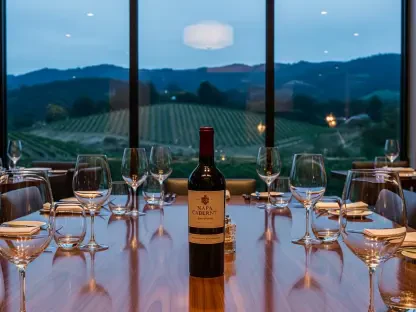In an era where travel fatigue from repetitive itineraries and overcrowded landmarks has become all too common, a refreshing shift is taking place among modern explorers seeking something deeper and more meaningful, and Airbnb, in collaboration with UNESCO, has responded to this yearning by introducing the Bali Cultural Travel Guide, an innovative initiative designed to uncover the island’s hidden cultural and natural treasures. This guide moves travelers away from the typical tourist traps and into the heart of Bali’s authentic essence, spanning five distinct regencies: Tabanan, Gianyar, Bangli, Buleleng, and Badung. The result is a transformative experience that prioritizes genuine connections over superficial sightseeing. This growing trend, particularly among Chinese travelers who value authenticity, signals a broader desire to escape urban monotony and embrace travel as a pathway to rejuvenation. With striking data showing that 95% of Chinese travelers on Airbnb opt for experiential activities and 60% prioritize real cultural engagement, Bali emerges as an ideal destination for such immersive journeys. Through serene landscapes, sacred traditions, and personal interactions with locals, these unique tours are redefining what it means to explore a place, offering a chance to live like a local and uncover profound insights.
Unveiling Bali’s Authentic Core
The partnership between Airbnb and UNESCO has crafted a travel experience that dives deep into Bali’s cultural fabric, guiding visitors through lesser-known locales and fostering meaningful exchanges with local communities. Across the five regencies, the Bali Cultural Travel Guide showcases a side of the island rarely seen by the average tourist, highlighting everything from traditional cuisine to intricate handicrafts. Travelers encounter hosts who open their homes and share personal stories, providing a window into the daily rhythms of Balinese life. These interactions reveal a warmth and hospitality shaped by centuries of tradition, making each moment feel uniquely personal. Beyond mere observation, guests are invited to participate in cultural practices, gaining a richer understanding of the values that define this island. This approach stands in stark contrast to the often impersonal nature of conventional tourism, where connection to a place can feel fleeting. Instead, the emphasis here is on building a sense of belonging, even if just for a short time, by engaging directly with the people who call Bali home. The result is a journey that feels less like a vacation and more like a cultural immersion, leaving a lasting impact on those who choose this path.
Another layer of depth comes from exploring historical and agricultural marvels that embody Bali’s ethos of harmony. The Subak irrigation system, a centuries-old method of rice farming recognized by UNESCO, offers a striking example of communal cooperation and reverence for nature. Travelers visiting sites like the Jatiluwih Rice Terraces in Tabanan Regency witness firsthand how this system sustains both the land and the community’s way of life. Local guides often explain the spiritual significance behind these practices, pointing to small shrines and symbols of gratitude woven into the landscape. This experience transcends mere sightseeing, as it invites reflection on sustainable living and the balance between human needs and environmental respect. Unlike typical tourist spots focused on quick photo opportunities, these encounters encourage a slower pace, allowing for a deeper appreciation of how history and culture shape the present. Such insights resonate with travelers seeking to understand the roots of a destination, reinforcing the value of authenticity over superficial appeal. The guide ensures that these lessons are accessible, blending education with exploration in a way that feels organic and enriching.
Finding Solace in Bali’s Natural Beauty
Bali’s breathtaking landscapes serve as a powerful antidote to the stresses of urban life, offering travelers a chance to reconnect with nature through Airbnb’s curated tours. Staying in accommodations like Villa Dada in Ubud, surrounded by dense jungle and the soothing sounds of nocturnal insects, creates an immediate sense of escape. These settings strip away the noise of modernity, replacing it with the calming rhythm of the natural world—think barefoot walks through lush greenery or quiet moments by a pool framed by tropical foliage. For many, this immersion in Bali’s serene environment is not just a break but a profound reset, allowing time to slow down and the mind to clear. The contrast to city living is stark, as the island’s unspoiled beauty provides a backdrop for relaxation and introspection. Far from the crowded beaches often associated with Bali, these experiences highlight remote areas where nature reigns supreme, inviting a deeper connection to the earth. This aspect of the cultural tours underscores the restorative power of the environment, proving that travel can heal as much as it inspires.
Beyond individual stays, the tours also showcase expansive natural wonders like the terraced rice fields of Jatiluwih, which offer both visual splendor and cultural significance. Walking through these meticulously maintained fields, often with a local guide, reveals the intricate balance of Bali’s agricultural heritage. The rolling hills, vibrant with emerald hues, are more than just a scenic view; they represent a way of life rooted in cooperation and respect for the land. Travelers learn how these landscapes are intertwined with spiritual beliefs, as small altars and offerings dot the fields, honoring the forces that sustain them. This experience stands apart from typical nature tours by weaving in stories of the people who tend these lands, adding a human element to the awe-inspiring scenery. The quiet beauty of tropical rainforests and hidden waterfalls further amplifies this sense of renewal, providing spaces for reflection away from the hustle of more commercialized areas. Such encounters emphasize that Bali’s natural allure is not just in its appearance but in the lessons it imparts about living in harmony with the surroundings, making every step a moment of discovery.
Exploring Bali’s Spiritual Depth
The spiritual heritage of Bali, shaped by a unique fusion of Hinduism, Buddhism, and indigenous beliefs, forms a cornerstone of Airbnb’s cultural tours, offering travelers profound insights into life’s balance. Temples like Pura Luhur Batukau, nestled within misty rainforests, exude a mystical aura that captivates visitors from the moment they arrive. Participating in rituals—such as wearing traditional sarongs or using holy water for purification—provides a tangible link to the island’s sacred practices. These moments, often guided by locals, reveal the philosophy of “Tri Hita Karana,” which stresses harmony between humans, nature, and the divine. For many travelers, stepping into these hallowed spaces is not just a cultural exercise but a chance to pause and reflect on personal values. The quiet reverence observed during temple visits fosters a universal sense of peace, transcending cultural differences. Unlike more tourist-heavy sites where spirituality can feel commercialized, these experiences remain authentic, rooted in the genuine faith of the Balinese people, and offer a rare opportunity for introspection.
Another dimension of this spiritual journey lies in witnessing how these beliefs permeate everyday life across Bali’s communities. Guides and hosts often share stories of how rituals and philosophies shape their routines, from offerings made at small family shrines to communal ceremonies during significant festivals. Travelers gain an appreciation for the seamless integration of the sacred into the mundane, seeing how balance is not just an ideal but a lived reality. This perspective challenges the often fast-paced, disconnected nature of modern living, prompting a reevaluation of priorities through the lens of Balinese wisdom. The tours ensure that such insights are not fleeting but are deepened through conversations and shared moments with locals, creating a bridge between ancient traditions and contemporary understanding. This spiritual exploration adds a layer of meaning to travel, transforming it into a journey of inner growth as much as outward discovery. Bali’s sacred spaces and philosophies thus become more than attractions—they serve as catalysts for personal transformation, resonating long after the trip ends.
Fostering Connections with Balinese Communities
A standout feature of Airbnb’s Bali tours is the emphasis on direct engagement with local communities, creating bonds that enrich both travelers and hosts. Meeting individuals like Gede, a host from a rural village far from the coastal tourist hubs, offers a glimpse into the authentic, unhurried pace of inland life. These hosts share not just their homes but also their personal histories, recounting traditions and daily experiences that paint a vivid picture of Balinese culture. Such interactions often occur during shared meals or casual conversations, breaking down barriers and fostering genuine understanding. The economic benefits for locals are significant, as hosting provides a sustainable income source while allowing them to showcase their heritage with pride. For travelers, these exchanges offer a perspective on Bali that goes beyond surface-level charm, revealing the resilience and warmth of its people. This mutual exchange redefines the host-guest dynamic, turning it into a partnership built on respect and curiosity.
Further enriching these connections are the opportunities to participate in community events and traditions, which add depth to the travel experience. Whether joining in preparations for a cultural festival or learning a local craft, travelers are welcomed as temporary members of the community rather than mere observers. This hands-on involvement contrasts sharply with the often detached nature of standard tourism, where interaction with locals can be limited to transactional encounters. The Airbnb guide facilitates these immersive moments by connecting visitors with hosts who are eager to share their way of life, ensuring that every interaction feels meaningful. Stories from hosts about their village’s history or family customs provide context that enriches even the simplest activities, turning them into cherished memories. This focus on community engagement highlights the power of travel to build cross-cultural bridges, proving that authentic experiences are often found in the smallest, most personal exchanges rather than grand spectacles.
Redefining the Essence of Travel
Reflecting on the impact of Airbnb and UNESCO’s Bali Cultural Travel Guide, it becomes clear that these tours have reshaped the way travel was once perceived, turning it into a conduit for personal growth and genuine connection. In the past, journeys through Bali often revolved around well-trodden paths, but this initiative shifted the focus to hidden cultural gems and heartfelt interactions. Travelers who embraced these off-the-beaten-path experiences discovered a side of the island that inspired through its traditions, landscapes, and people. The emphasis on authenticity, supported by local hosts and immersive activities, provided a stark contrast to the homogenized itineraries of yesteryear. Looking ahead, the success of such programs suggests a promising direction for sustainable tourism, where destinations can preserve their heritage while meeting the modern desire for depth over distraction. As more travelers seek meaning in their explorations, platforms like Airbnb could expand similar guides to other regions, ensuring that cultural appreciation remains at the forefront. This evolution in travel invites a broader conversation about balancing tourism with preservation, encouraging all stakeholders to prioritize experiences that honor both the visitor’s quest for discovery and the host community’s way of life.









